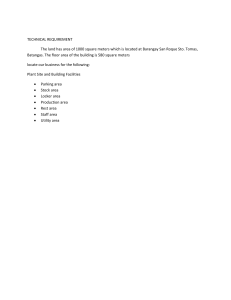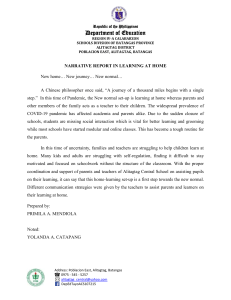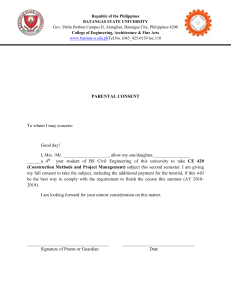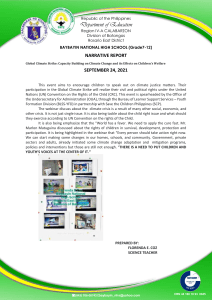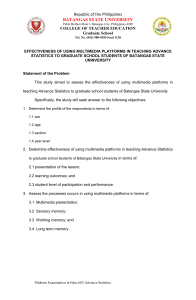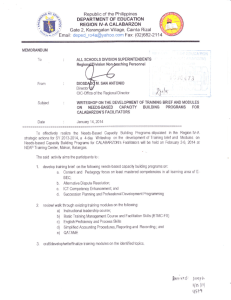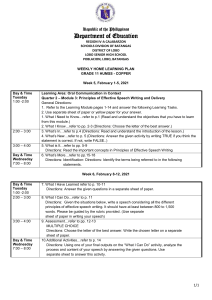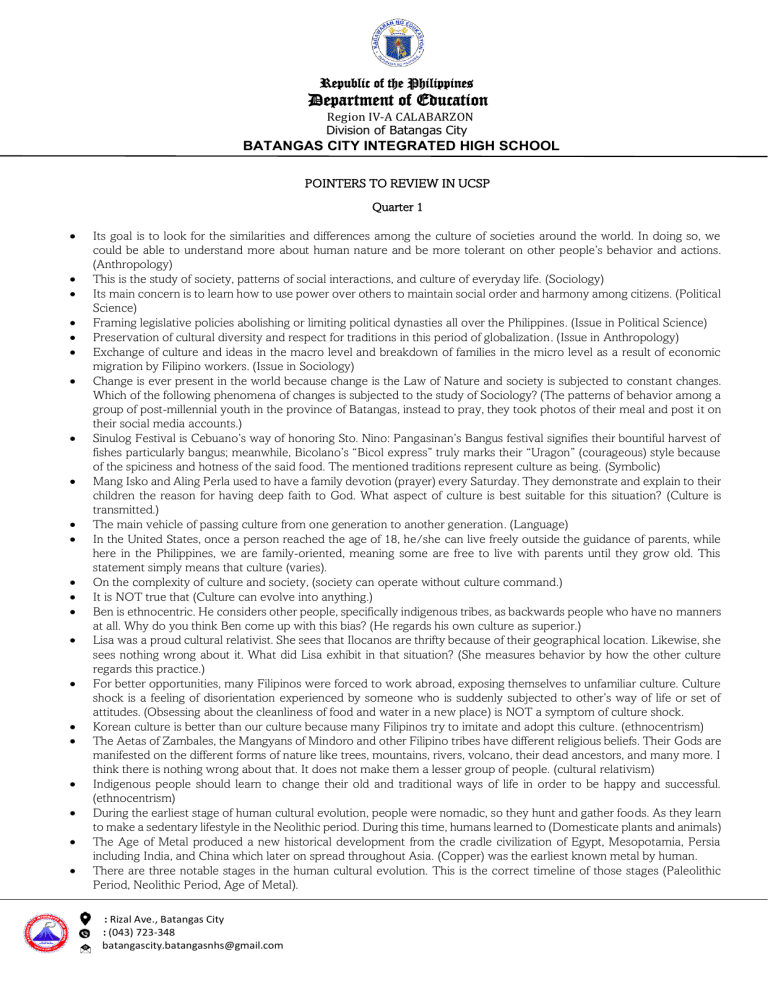
Republic of the Philippines Department of Education Division RegionofIV-A Batangas CALABARZON City ZON DivisionEducation of Batangas City BATANGAS CITY of INTEGRATED Division Batangas City HIGH ZON SCHOOL POINTERS TO REVIEW IN UCSP Quarter 1 • • • • • • • • • • • • • • • • • • • • • • : Its goal is to look for the similarities and differences among the culture of societies around the world. In doing so, we could be able to understand more about human nature and be more tolerant on other people’s behavior and actions. (Anthropology) This is the study of society, patterns of social interactions, and culture of everyday life. (Sociology) Its main concern is to learn how to use power over others to maintain social order and harmony among citizens. (Political Science) Framing legislative policies abolishing or limiting political dynasties all over the Philippines. (Issue in Political Science) Preservation of cultural diversity and respect for traditions in this period of globalization. (Issue in Anthropology) Exchange of culture and ideas in the macro level and breakdown of families in the micro level as a result of economic migration by Filipino workers. (Issue in Sociology) Change is ever present in the world because change is the Law of Nature and society is subjected to constant changes. Which of the following phenomena of changes is subjected to the study of Sociology? (The patterns of behavior among a group of post-millennial youth in the province of Batangas, instead to pray, they took photos of their meal and post it on their social media accounts.) Sinulog Festival is Cebuano’s way of honoring Sto. Nino: Pangasinan’s Bangus festival signifies their bountiful harvest of fishes particularly bangus; meanwhile, Bicolano’s “Bicol express” truly marks their “Uragon” (courageous) style because of the spiciness and hotness of the said food. The mentioned traditions represent culture as being. (Symbolic) Mang Isko and Aling Perla used to have a family devotion (prayer) every Saturday. They demonstrate and explain to their children the reason for having deep faith to God. What aspect of culture is best suitable for this situation? (Culture is transmitted.) The main vehicle of passing culture from one generation to another generation. (Language) In the United States, once a person reached the age of 18, he/she can live freely outside the guidance of parents, while here in the Philippines, we are family-oriented, meaning some are free to live with parents until they grow old. This statement simply means that culture (varies). On the complexity of culture and society, (society can operate without culture command.) It is NOT true that (Culture can evolve into anything.) Ben is ethnocentric. He considers other people, specifically indigenous tribes, as backwards people who have no manners at all. Why do you think Ben come up with this bias? (He regards his own culture as superior.) Lisa was a proud cultural relativist. She sees that Ilocanos are thrifty because of their geographical location. Likewise, she sees nothing wrong about it. What did Lisa exhibit in that situation? (She measures behavior by how the other culture regards this practice.) For better opportunities, many Filipinos were forced to work abroad, exposing themselves to unfamiliar culture. Culture shock is a feeling of disorientation experienced by someone who is suddenly subjected to other’s way of life or set of attitudes. (Obsessing about the cleanliness of food and water in a new place) is NOT a symptom of culture shock. Korean culture is better than our culture because many Filipinos try to imitate and adopt this culture. (ethnocentrism) The Aetas of Zambales, the Mangyans of Mindoro and other Filipino tribes have different religious beliefs. Their Gods are manifested on the different forms of nature like trees, mountains, rivers, volcano, their dead ancestors, and many more. I think there is nothing wrong about that. It does not make them a lesser group of people. (cultural relativism) Indigenous people should learn to change their old and traditional ways of life in order to be happy and successful. (ethnocentrism) During the earliest stage of human cultural evolution, people were nomadic, so they hunt and gather foods. As they learn to make a sedentary lifestyle in the Neolithic period. During this time, humans learned to (Domesticate plants and animals) The Age of Metal produced a new historical development from the cradle civilization of Egypt, Mesopotamia, Persia including India, and China which later on spread throughout Asia. (Copper) was the earliest known metal by human. There are three notable stages in the human cultural evolution. This is the correct timeline of those stages (Paleolithic Period, Neolithic Period, Age of Metal). : Rizal Ave., Batangas City : (043) 723-348 batangascity.batangasnhs@gmail.com Republic of the Philippines Department of Education Division RegionofIV-A Batangas CALABARZON City ZON DivisionEducation of Batangas City BATANGAS CITY of INTEGRATED Division Batangas City HIGH ZON SCHOOL • • • • • • • • • • • • • • • • • • From being nomads during the early stage, human began to develop a sedentary type of society of which they built-up villages and towns. This happened during the (Neolithic Period). The most significant evolution in Paleolithic period is when people discovered the use of fire. In the Neolithic period is when human learned to domesticate plants and animals, which is known to be the First Agricultural Revolution. In the Age of Metal, is the discovery of people in using metal as their tools, thus, the Age of Metal is identified as: (Rise of Civilization). The first modern humans (Homo sapiens) differed from other hominid species for (they used symbolic thought.) From the different kinds of government in various societies, (Democracy) is a form of government where the citizens of the nation have the power to vote. (River valleys) were the geographic features common to the development of civilizations in ancient Egypt, China, India, and Mesopotamia. This is the place where a person is enculturated through immersing himself or herself in serving others with the help of other individuals. We are all part of a (community) that would help us understand our own cultural and values orientation. As the saying goes, it takes a village to raise a child. Because of these, a child needs a group of individuals who will shape his or her culture, beliefs and values. This group of individuals are the (Agents of Socialization). The first agent of socialization is our family most especially our parents. Throughout our life we will have our set of chosen family that will also guide us in socialization and teach us to interact with other people. (Peer Group) is our chosen family. Aside from teaching morality and reverence to our Creator, the (Church) also instills cultural appreciation and cultural values that would shape the personality of a child. (Family) is the first agent of socialization that influences the development of a person intensively. Enculturation shapes an individual through different processes. Knowingly or unknowingly, one internalizes the practices of the group he or she belongs. Which among the following, one can be best enculturated? (socializing with others) In your everyday life in school or in your neighborhood, your “kabarkada” is an example of: (Secondary Group) Typically, a small social group whose members share close, personal and enduring relationships. (Primary group) Among different kinds of social groups in our society, this can be small or large, mostly impersonal and usually short-term. (Secondary Group) In various manifestations of characteristics of social group, below are examples of in-groups EXCEPT: (Network and Social Group) Nowadays technology-based social group has been already part of everyone’s daily life. As such, social networking sites are considered as powerful (Communication) tools. These are sets of informal and formal social ties that link people to each other. (Networks) Network is a highly influenced the lives of the people. Which of the following is the true reason for forming networks: (Socio-Cultural) “The highest power is the human mind. That’s where God came from and my belief in God is my belief in myself.” – Morgan Freeman GODBLESS!!! : : Rizal Ave., Batangas City : (043) 723-348 batangascity.batangasnhs@gmail.com
